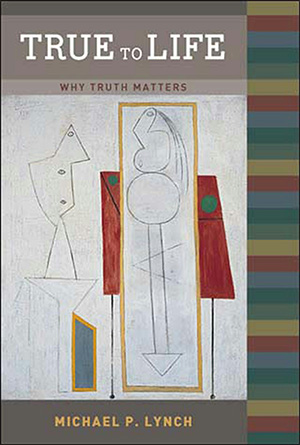Is Truth Relative?

Relativism, almost more than any other philosophical topic, gets people riled up. Discussions of it pepper the internet, fill op-ed pages, and crop up in the Pope’s encyclicals. Opinions differ, to put it mildly, running from Stanley Fish’s declaration that relativism “is just another name for serious thought” to the conviction of conservative critics Allan Bloom and Robert Bork that relativism threatens to end Western civilization as we know it.

Relativism about truth is nonetheless an idea with a venerable history, whose original champion, at least in Western culture, is usually thought to be the Greek philosopher, Protagoras. According to Plato at least, Protagoras believed that man is the measure of all things — be they values or the more mundane objects of everyday life. Plato interpreted this as an endorsement of the view that truth in general is in the eye of the beholder, or is relative. Nowadays, it is more common to encounter endorsements of relativism outside of philosophy departments. Indeed, the idea, or at least what appears to be the idea, has taken root across the intellectual spectrum — in anthropology, sociology, the humanities, and religious studies.
By that standard, Protagoras’s idea is one of the most successful philosophical theories of all time. The “über thought” behind relativism is that different opinions can be equally true relative to different standards. Interestingly, relativism is often motivated by some of the same things that motivate skepticism. People disagree about almost everything. And about some things, like religion, or politics, or morality, their disagreements are so wide and deep it can be difficult to find any common ground. Add to this the fact that our thoughts and perceptions are likely to bear the imprint of our biases, background assumptions, and expectations, and we arrive at the following premises:
⠀(1) People have different beliefs about what is true.
⠀(2) There is no way of stepping outside of our beliefs and checking to see ⠀whose are objectively true.
From these premises, skeptics conclude that there is some objective fact of the matter about who is right and who is wrong, but that we just can’t find out what it is. Relativists draw a different conclusion: Not that we can’t know what is true, but that there simply isn’t any objective truth to know. Truth is always truth in context; what is true for one person might not be true for another.
If truth is relative to culture, some believe, then it is culture that matters, not truth.
Despite the hostility that debates over relativism generate, many relativists and their opponents seem to agree on one thing. What they agree on is that if relativism really is the truth about truth, then truth doesn’t matter. If truth is relative to culture, some believe, then it is culture that matters, not truth. This is seen as terrifying to some, liberating to others.
Unsurprisingly, the extremists on both sides are wrong. Relativism is not necessarily a threat to truth’s value. The common temptation to think otherwise is the result of another myth: that truth matters only if it is absolute. But like the fable that truth can’t be a goal unless we can be certain that we’ve reached it, we need to see beyond this fiction. One can grant that some truths are relative without implying that having true beliefs is not important, or a goal of thought, or worth caring about for its own sake. This is not to say that there aren’t versions of relativism that do have these, and worse, implications. Some relativist views are crazy. But not all are. When it comes to relativism, my advice is to roll up your sleeves, make the necessary distinctions, keep the good, and discard the bad.
Simple(minded) Relativism
Philosophers have been busy refuting relativism about truth ever since Plato. This is deceptively easy when the target is the idea that truth is relative to the tiniest perspectives, like a single individual. Truth, on this position, is something like “truth for me.” Call this simple relativism.
Here’s why simple relativism is so simple to refute. Suppose I am such a relativist and announce that there is no such thing as truth per se, there is only truth-for-me or truth-for-you. A fair question to ask would be whether the statement I just made is true or just true-for-me. If I say that relativism is simply true, then I have apparently contradicted myself. For if relativism is true (for everyone, as it were) then it is false — it is not true that all truth is relative. On the other hand, if I go the other way and say that relativism is only true relative to me, I am consistent but unable to convince anyone who doesn’t already agree with me. You need only remark that relativism is not true for you, and therefore false. Simple relativism, therefore, is either contradictory or terminally unconvincing.
Whether a relativist would accept this little argument, I am unsure; perhaps simple relativists don’t care about convincing anyone to be relativists. But there is an even simpler problem with simple relativism. It is this. Simple relativism implies that all my beliefs are true. For if truth is truth-for-me, and since everything I believe is true for me (or I wouldn’t, obviously, believe it), everything I believe, according to the theory, is true. I never make mistakes. How convenient!
This last point is the damning one. If there is one thing I know, it is that I don’t know everything, and no theory that says otherwise can be true or true for me.
One reason that people sometimes favor relativism — even simple relativism — over objective theories of truth is the sense that relativism encourages greater toleration. The thought that there is Truth out there with a capital “T” often goes together, relativists have pointed out, with the conviction that some people have privileged access to the truth and others don’t. Just this sentiment was the hallmark of 19th-century Western colonialism, when missionaries worked with the armies and police of colonial governments to force people to believe, or at least say they believed, what the colonialists wanted them to. But if there is no such thing as objective truth, then no one occupies a privileged position on the truth. We can no longer justify forcing people to believe in our gods by saying that we know the truth and they don’t. Abandoning the idea of objective truth seems to encourage a more tolerant outlook on life.
Concern for toleration is apt and important. And many people who have believed in objective truth have been intolerant. But it is a confusion to think that a belief in objective truth necessarily implies a lack of respect for other ways of life and other types of beliefs. The cause of intolerance is not objectivity but dogmatism. It stems from a sense that one can’t be wrong. Many people do indeed think that they (and they alone) know the real truth, whether we are talking about God, apple pie, or the New York Yankees. It is depressingly common for people to think they personally know what the truth is on any subject. But one needn’t believe that we know anything for certain to think that there is objectivity. The degree to which we believe there is objective truth about some subject is the degree to which we must admit that we can always be wrong about that subject — which is to say that we cannot be certain that our beliefs about it are correct. If truth is objective, then we must always be open to the possibility of being wrong. Thus respect for others should lead us to be careful about claiming that we know anything for certain, and that means believing that truth is more than just truth-for-me.
Simple relativism, were we able to make complete sense of it, would obviously undermine truth’s value. If everything you believe is true anyway, there is not much point in saying that you ought to believe the truth. There wouldn’t be much point in talking about truth at all. A basic point of even having a truth concept is to help us evaluate some statements as right and others as wrong. But if no one ever makes a mistake, such a concept would be pointless.
Luckily for us, simple relativism is simpleminded. Not every belief is true. Some are false, as attested by anyone foolish enough to believe simple relativism.
A closing point. Conservative critics often write as if simple relativism was the scourge of the Western world. They portray all college students, for example, as being brainwashed into this type of relativism by wild-eyed professors whose politics are somewhere to the left of Castro’s. And philosophy professors, who hear what seem to be endorsements of simple relativism all the time from their students, sometimes call it “freshman relativism.” In fact, simple relativism appears more popular than it actually is. It is true that in ordinary conversation, questions about morality, art, or politics are usually referred to as “matters of opinion.” We might also call them “who’s to say” issues, given the ubiquitous use of that phrase when such issues are brought up (as in: shrug, followed by “who’s to say?”). The funny thing about such questions, of course, is that we all do have opinions, and passionate opinions, about them. The death penalty, gay rights, arms control — we care about these issues. Thus in asking “who’s to say” we answer our own question: we are.
The phrase “it is true for me but not for you” is most often just shorthand for: “I believe it, you don’t, so let’s talk about something else.”
Further, we all recognize that there can be better and worse opinions about any of these subject matters — some opinions are simply better informed, more coherent, or just darn well more interesting than others. We even think that some opinions (2 plus 2 equals 4) are true and others (humans are invulnerable to bullets) are false. So why are so many of us apt to announce that they are not “matters of fact” but “matters of opinion” and assume that this means that truth is relative? Part of the reason is simple: When someone says that “this is true for me,” they don’t necessarily mean to be endorsing a philosophical position. The phrase “it is true for me but not for you” is most often just shorthand for: “I believe it, you don’t, so let’s talk about something else.” Similarly, the phrase “it is a matter of opinion” is a conversation-stopper, a way of getting out of a debate one doesn’t want to be in. This desire is often a very good thing, but such conversation-stoppers sometimes prevent us from having reasoned discussions about the issues that matter most. And they encourage us to think we are saying something deep (“truth is relative”) when really we are doing no such thing. At best, we are either stopping the conversation, or trying to express (in perhaps a less than felicitous way) the idea that everyone is entitled to his or her own opinion. But of course, the fact that one should allow other people the opportunity to speak their minds and (to as great a degree as possible) practice what they preach doesn’t entail that no one has ever been wrong about anything.
So don’t assume that people are simple relativists because they attach qualifications to their opinions. This is a point that those who like to blame relativism for everything would do well to keep in mind. Simple relativism is a bogeyman; it is incoherent and believed by few if anyone.
Michael P. Lynch is Board of Trustees Distinguished Professor of Philosophy at the University of Connecticut, where he directs the Humanities Institute. He is the author of several books, including “In Praise of Reason,” “On Truth in Politics” (Princeton University Press), and “True to Life,” from which this article is excerpted.



